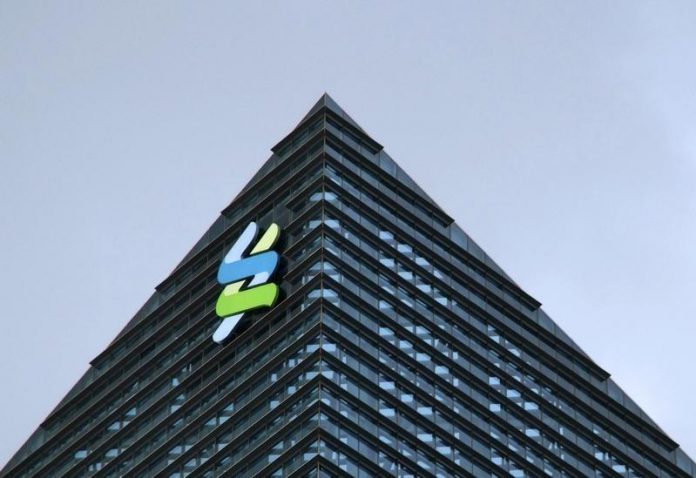NEW YORK/LONDON (Reuters) – Standard Chartered Plc (STAN.L) has warned it faces another fine from New York’s financial regulator for problems in its anti-money laundering controls, piling more pressure on the Asia-focused bank and its bosses.

The London-based bank said on Wednesday problems in its surveillance system – part of its anti-money laundering systems and controls – were likely to result in a fine, remedial action and an extension of a two-year monitoring period.
The monitoring was imposed in 2012 after StanChart was fined $667 million by U.S. regulators for breaking U.S. sanctions by hiding transactions linked to Iran so they would not be detected, which rocked the bank and heralded a series of problems in the last two years.
Chief Executive Peter Sands said the latest issues, which were spotted by the New York regulator’s monitor Ellen Zimiles, were related to computer surveillance faults and were less serious than those it previously had to contend with.
“We do not believe the impact to be of the same scale as the very different issues the group faced two years ago,” Sands told reporters on a conference call. He said the financial penalty should be less than the $340 million the bank paid to the New York regulator in 2012. It is likely to be more than $100 million, a person familiar with the matter told Reuters before the bank announced the problem.
StanChart is not alone in feeling the heat from U.S. authorities for breaking sanctions and for broader conduct mis-steps. European rivals HSBC (HSBA.L), Barclays (BARC.L) and UBS UBSN.VX have all been hit and BNP Paribas (BNPP.PA) was fined a record $9 billion last month for breaching sanctions related to Sudan and Iran.
But the latest revelation still comes at a bad time for StanChart, two years to the day since New York regulator Benjamin Lawsky called it a “rogue institution” for the extent of its sanction busting.
Big losses in Korea, a slowdown in investment banking and the impact of tougher regulations have halted its run of 10 years of record earnings and some investors have called for change at the top.
The bank last month rejected reports it had stepped up succession plans for its Chairman John Peace and for Sands, who has been CEO for 7-1/2 years. It said its board was united behind the two in restoring the bank to profitable growth.
FULL AGENDA
Sands said he had no plans to step down. “I have a job. I don’t have other plans and I have a very full agenda of things on my plate,” he said.
The computer problems relate to a failure to flag potential illegal activity. Banks’ systems should spot possible problems and generate a suspicious activity report for the regulator. But Sands said a systems upgrade in 2007 did not strengthen the surveillance process as well as it should have done.
The transactions should have been flagged by the bank’s computers because of concern that sanctioned parties could re-route transactions through high-risk countries or entities not subject to sanctions before entering the U.S. financial system, the person familiar with the matter said.
StanChart disclosed the investigation as it reported a 20 percent fall in pretax profit in the six months to the end of June to $3.3 billion.
The bank had warned in June that profits would be down by about a fifth as its investment bank revenue was hit by weak trading activity, and Sands said on Wednesday many of the difficult conditions that hurt the financial markets unit in the first half had continued in July.
The bank also took a $175 million provision to cover commodities fraud in China related to problems at Qingdao port, which has been at the centre of an investigation into fraud at metals warehouses. Sands said he did not think it was part of a wider problem with commodities in China.
Shares in StanChart were down 1.7 percent at 11.96 pounds by 1135 GMT, in line with a weak European bank index. The stock is down 10 percent this year, compared with a flat bank index, and last month fell to a two-year low.
Analysts said the weak results had been well flagged but the outlook remained challenging. StanChart makes most of its earnings in Asia, Africa and the Middle East and said it expects profits in 2014 to fall for a second straight year. Its financial markets business and operations in Korea were the main trouble spots in the first half.
Related Coverage
- Standard Chartered CEO: problems with NY regulator not same scale as 2012
- StanChart takes $175 million provision for suspected Qingdao fraud
The bank made a $127 million loss in Korea and has sold parts of the business, cut staff, shut branches and refocused on international clients to try to turn around the business.
Financial markets revenue fell 20 percent, mainly due to sharp falls in foreign exchange trading and interest-rate trading products.
“We are taking action to get us back on the track of sustainable growth,” Sands said, noting the bank had sold non-core assets, cut costs, made changes in senior management and changed its structure in an attempt to sharpen its focus.
















